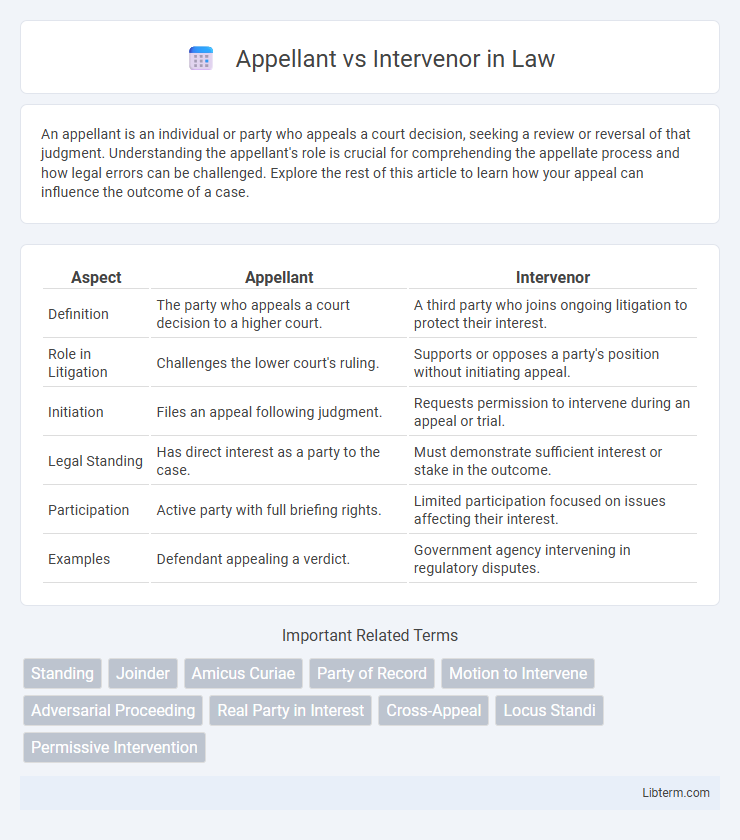An appellant is an individual or party who appeals a court decision, seeking a review or reversal of that judgment. Understanding the appellant's role is crucial for comprehending the appellate process and how legal errors can be challenged. Explore the rest of this article to learn how your appeal can influence the outcome of a case.
Table of Comparison
| Aspect | Appellant | Intervenor |
|---|---|---|
| Definition | The party who appeals a court decision to a higher court. | A third party who joins ongoing litigation to protect their interest. |
| Role in Litigation | Challenges the lower court's ruling. | Supports or opposes a party's position without initiating appeal. |
| Initiation | Files an appeal following judgment. | Requests permission to intervene during an appeal or trial. |
| Legal Standing | Has direct interest as a party to the case. | Must demonstrate sufficient interest or stake in the outcome. |
| Participation | Active party with full briefing rights. | Limited participation focused on issues affecting their interest. |
| Examples | Defendant appealing a verdict. | Government agency intervening in regulatory disputes. |
Understanding the Role of Appellant
The appellant initiates an appeal by challenging a court's decision, seeking a review and potential reversal of the lower court's ruling. This party holds the burden of demonstrating legal errors or misinterpretations that justify altering the judgment. Understanding the appellant's role is crucial in appellate proceedings, as they drive the case's progression by presenting substantive arguments for reconsideration.
Defining the Intervenor in Legal Proceedings
An intervenor in legal proceedings is a third party who voluntarily enters an ongoing lawsuit to protect their own interests related to the case's subject matter. Unlike appellants, who challenge a court's decision from a party directly involved in the original case, intervenors seek to contribute additional perspectives or evidence without initiating separate appeals. Courts typically require intervenors to demonstrate a significant legal interest that may be directly affected by the outcome to be granted permission to join the case.
Key Differences: Appellant vs Intervenor
An appellant is a party who appeals a court decision seeking a reversal or modification of the judgment, while an intervenor voluntarily joins an ongoing lawsuit to protect their interest without initiating the case. The appellant challenges the original ruling, whereas the intervenor assists the court by providing additional perspectives relevant to the dispute. Appellants have a direct stake in the appeal outcome, whereas intervenors typically influence the case outcome indirectly through their participation.
Legal Rights of an Appellant
An appellant holds the legal right to challenge a lower court's decision by seeking a higher court's review, aiming to overturn or modify the ruling based on alleged errors in law or procedure. This right ensures due process by allowing the appellant to present arguments and evidence supporting reversal or remand of the case. Unlike an intervenor, who enters an ongoing lawsuit to protect specific interests, the appellant initiates the appeal as a direct party contesting the judgment.
Legal Standing of an Intervenor
Legal standing of an intervenor requires a direct, substantial interest in the litigation's outcome, distinct from that of the original parties. Courts assess whether the intervenor can demonstrate injury or potential harm that the case's resolution may affect, ensuring their participation is justified rather than merely collateral. Unlike appellants who challenge decisions based on their direct stake, intervenors gain standing to protect specific legal interests that might not otherwise be represented.
Common Scenarios Involving Appellants
Appellants often appear in cases where they challenge a trial court's final judgment or order, seeking reversal or modification. Common scenarios include appeals in civil disputes, criminal convictions, and administrative decisions where the appellant alleges legal errors or procedural violations. Intervenors typically join ongoing litigation to protect their interests without initiating the original appeal.
Typical Cases for Intervenor Participation
Typical cases for intervenor participation include environmental litigation where community groups seek to protect local ecosystems, and complex commercial disputes involving multiple stakeholders with vested interests. Intervenors often join cases to present specialized expertise or advocate for public interest without initiating original claims. Their involvement ensures broader perspectives are considered in judicial decisions, particularly in regulatory, land use, and civil rights cases.
Impact on Court Decisions: Appellant vs Intervenor
Appellants directly challenge the trial court's decision by appealing the judgment, which can lead to a reversal or modification of the original ruling. Intervenors join ongoing litigation to protect their interests without initiating an appeal, influencing the outcome by presenting additional evidence or arguments. The presence of an intervenor may broaden the court's considerations, but the final decision primarily hinges on the appellant's grounds for appeal and the legal merits.
Procedural Steps: From Appeal to Intervention
The procedural steps from appeal to intervention begin with the appellant filing a notice of appeal to challenge the lower court's decision. Intervention involves a third party filing a motion to join ongoing litigation, usually requiring court approval to participate. Courts assess timeliness, interest, and potential prejudice when deciding whether to grant intervention during the appellate process.
Strategic Considerations: Appellant and Intervenor Collaboration
Strategic collaboration between appellant and intervenor enhances the strength of legal arguments by combining resources and expertise, creating a unified front in appellate litigation. Coordinated efforts allow for comprehensive briefing and evidence presentation, addressing multiple facets of the case to influence appellate court decisions effectively. Aligning objectives and communication strategies reduces redundancy and mitigates conflicts, maximizing the potential for favorable outcomes in complex appeals.
Appellant Infographic

 libterm.com
libterm.com